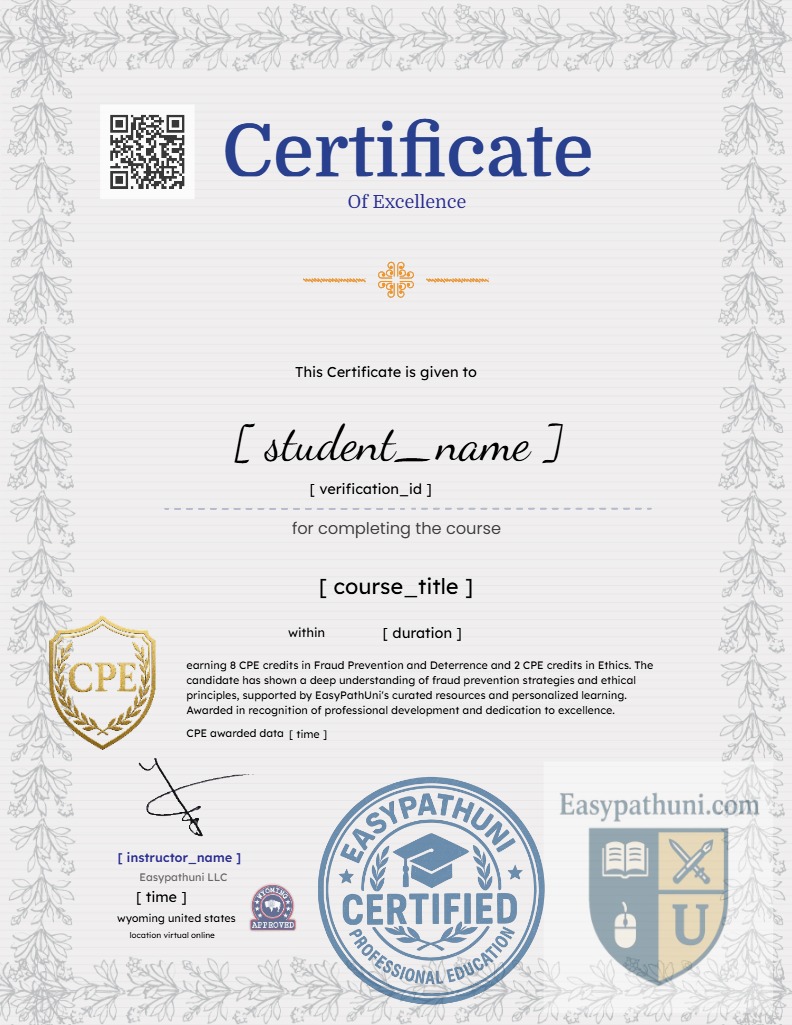Fraud Prevention and Deterrence

About Course
Section Four: Preventing Corrupt Practices – Study Summary
This section identifies the crime of preventing and deterring fraud within companies. It combines forward-looking insights into why people commit fraud with practical techniques for combating it. The main areas discussed are:
Understanding Criminal Behavior: Changing Motives and Behavioral Habits.
Forming It from White Collars: Contributors to the Greatness of the Greatness, not the Greatness of Individuals or Organizations.
Large Corporations: Highlighting the Role of the O in Preventing Discrimination.
Managing Fraud: Discusses how management manages risk and mitigates discrimination.
Explaining the Role of the Auditor in Detecting Fraud-Related Violations: Explaining the Role of the Auditor in Detecting Fraud-Related Violations: Explaining the Role of the Auditor in Detecting and Preventing Fraud.
Antivirus Programs: Guidelines on How to Combat Malicious Insects.
Brand Evaluation: Official Brand Frameworks.
Doctor of Medicine: Obtained a Doctorate in Medicine from the University of…
Ethics for Authorities Examination: Emphasizes ethical behavior in authorities examination.
Professional Code of the Chartered Accountants Profession and Code of Standards for the Chartered Accountants Profession: Discusses the introductory nature of Chartered Accountants.
The section also provides valuable insights into the police, exploring smaller, faster species and their effects. It emphasizes the importance of confirming the presence of animals to inspectors, and discusses the Chartered Certified Professionals (ACFE) and Chartered Certified Professionals (CFE) Codes.
earning 8 CPE credits in Fraud Prevention and Deterrence and 2 CPE credits in Ethics. The candidate has shown a deep understanding of fraud prevention strategies and ethical principles, supported by EasyPathUni’s curated resources and personalized learning. Awarded in recognition of professional development and dedication to excellence.
Disclaimer:
The content provided in this training section is exclusively educational and designed for preparation in the Certified Fraud Examiner (CFE) subject matter. EasyPathUni is an independent training institute and is not affiliated with, endorsed by, or officially connected to the Association of Certified Fraud Examiners (ACFE) or any other certifying organization.
The certificate awarded upon completion of this course is a preparatory certificate intended solely to recognize course attendance and readiness; it does not represent an official CFE credential or certification.
All intellectual property rights related to the official CFE exam and materials belong exclusively to their respective owners. Redistribution, reproduction, or unauthorized sharing of this training content without prior written consent is strictly prohibited and may lead to legal actions.
This disclaimer upholds the integrity, confidentiality, and rights of all parties involved while ensuring transparency regarding the purpose of this training.
Course Content
4.0
-
4.0 index
-
-
4.1 Understanding Criminal Behavior
-
4.1 Understanding Criminal Behavior read me
-
4.2 White-Collar Crime
-
4.2 White-Collar Crime
-
4.3 Corporate Governance Overview
-
4.3 Corporate Governance Overview
-
4.4 Management’s Fraud-Related Responsibilities
-
4.4 Management’s Fraud-Related Responsibilities
-
4.5 Auditors’ Fraud-Related Responsibilities
-
4.5 Auditors’ Fraud-Related Responsibilities
-
4.6 Fraud Prevention Programs
-
4.6 Fraud Prevention Programs
-
4.7 Fraud Risk Assessment
-
4.7 Fraud Risk Assessment
-
4.8 Fraud Risk Management
-
4.8 Fraud Risk Management
-
4.9 Ethics for Fraud Examiners
-
4.9 Ethics for Fraud Examiners
-
4.10 Association of Certified Fraud Examiners Code of Professional Ethics
-
4.10 Association of Certified Fraud Examiners Code of Professional Ethics
-
L CFE PART 4 99
-
CFE PART
-
L CFE PART 4 10 25-5-2025
Earn a certificate
Add this certificate to your resume to demonstrate your skills & increase your chances of getting noticed.

